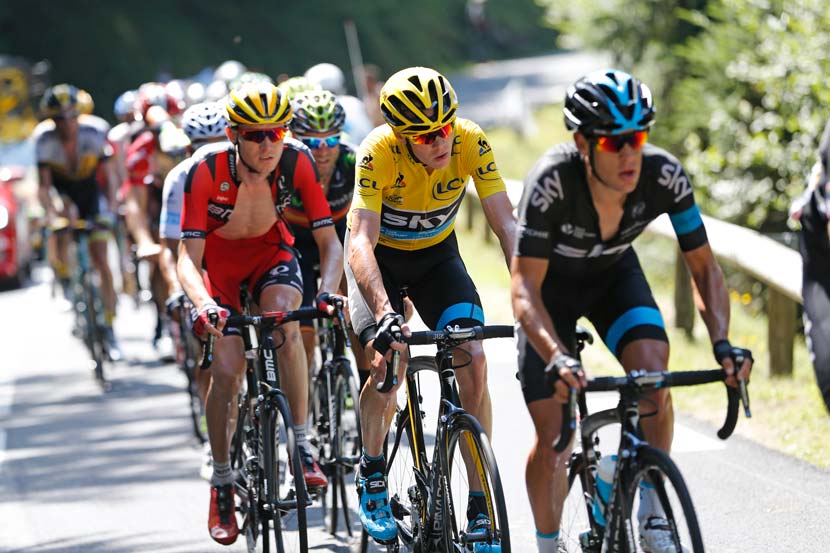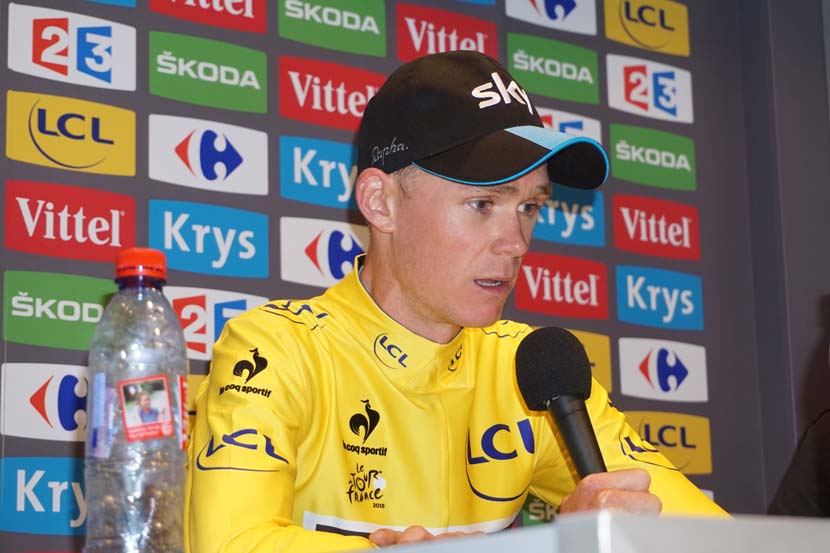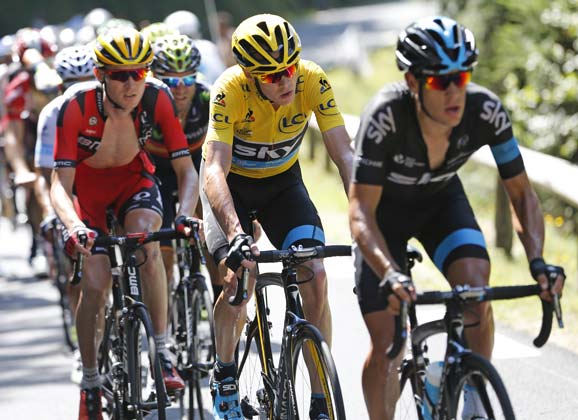First and second in stage 10 are good friends and team-mates but next year one of those factors will change: Richie Porte is moving on from Team Sky. It raises a few questions on how the pair will cope… and if the Tasmanian may, in fact, be better than his British mate.

Porte leads Froome and van Garderen in stage 10 of the 2015 Tour.
Photo: Yuzuru Sunada
What happens when Froome and Porte split?
– By Rob Arnold
For years now they’ve been part of each other’s lives: Chris Froome and Richie Porte have been team-mates since 2012 and close friends because of that association. We’ve seen their interaction on the road during races and heard about their appreciation for one another often. We understand that the pair have a good rapport and realise, after a race like stage 10 yesterday, that they are a formidable combination on the bike. But that professional partnership really only has a couple of weeks to go before the inevitable split.
They’ll race in the same colours until the end of the year but the Tour is likely to be the final major competition in which Froome and Porte race as allies.
Changing teams isn’t quite a divorce but there are similarities. There’s no alimony (or, in this case – as vows were never exchanged – no palimony) to worry about but there is plenty to consider once the pair go their separate ways.
Sure, they’ll remain friends. There is mutual respect but also an understanding of their particular traits and characteristics, and an appreciation that is both part of the public perception of Team Sky but it is also very much apparent when speaking to either Chris or Richie in private. There is a genuine affinity between the two.
Even as the Tour is rolls towards Paris, Porte continues to repeat the mantra: “At the end of the day I’m here for Chris Froome; he’s my good mate and I’d love to see him win another Tour.”
But we know that’s going to change soon. The official start date for Porte racing with his new team is 1 January 2015. Apparently there’s still speculation about where he’s going but it’s the worst kept secret of the (as yet unofficial) transfer season. Black and blue to black and red… need anything else be said?
Remember, according to UCI rules we can’t talk about this yet… so we’ll keep it simple and just move on to the premise of this piece: what happens when the two riders stop working together.
Keep your friends close and your enemies closer – or something like that, right? That’s how it goes. If there’s a rider who might be able to beat the leader of a team, then the team can offer said rider a job and that negates any concerns about being beaten.
Team Sky has managed itself extremely well and in its fifth season it appears likely to nab a third Tour de France title.
After 10 stages, it seems Froome will win again. Of course a lot can happen but this commentary isn’t so much about the 2015 race but what will happen when the two friends become rivals.
Froome insists that he’s got no secrets – certainly none that relate to magic elixirs – and although speculation is rife about why he’s so dominant, he responds to questions about doping by telling everyone that he’s done all he can to be utterly transparent.
“What haven’t I done?” Froome responded in reaction to a question of what else it is he can do to convince the public that he’s not doping. “I’ve tried to be as much of a spokesman as I can for clean cycling. I’ve spoken to the CIRC. I’ve made suggestions to the governing body to implement things like night-time testing. I’ve pointed out when I’ve felt there hasn’t been enough testing up in places like Teneriffe.
“What else is a clean rider supposed to do?”

Chris Froome after winning stage 10 in the yellow jersey and increasing his advantage over Tejay van Garderen. The Team Sky leader now has a lead of 2:52 over the American from BMC Racing.
Photo: Rob Arnold
Froome in another realm compared to other riders at the Tour in 2015. The same could have been said about Vincenzo Nibali in 2014.
Form comes and form goes. But the lessons from the years at Sky will serve Porte well even when he moves on. There might not be secrets but the team is protective of its methods, preferring to (try to) keep power data in-house and not divulging the finer details to a broader community. It makes sense: if they have ways to get their riders in prime condition why would they share it with their rival teams.
Consider the very simple act of warming down after a stage. This is difficult to keep secret; for the sake of convenience, it’s a public act. Okay, Sky might have been able to have a motorhome equipped with home trainers and tinted windows but, since 2011, riders have stopped races and stepped back onto their bikes again after they have been attached to a ‘home-trainer’. It eases the shock of going from an intense effort to idle and makes perfect sense still, it was mocked by other teams five years ago… now they’re all doing it.
Altitude training is not new either. The locations are even often the same between teams and the methods may vary slightly but the premise is simple: ride up and down mountains and sleep where the air is thinner. They’re all doing it but Sky’s methods seem to be very effective. At least that’s the conclusion you can draw after seeing stage 10 of the 2015 Tour: Froome first, Porte second, Thomas sixth… first in the team classification for the race to La Pierre-Saint-Martin (6:02 ahead of Movistar) and first overall in the same category (6:03 ahead of BMC).
Not bad, not bad at all.

Richie Porte finished second behind Chris Froome in stage 10; he was the only rider inside a minute on the day of domination by Team Sky.
Photo: Yuzuru Sunada
We’ve seen the racing, understand the arrangement at Sky and realise that Porte is an absolutely valuable asset for the team even if everyone is aware that it’s all due to change in the coming months.
The very fact that it’s become so public raises the question: is it time for another mockery of the UCI transfer regulations and another mid-season transfer? It happened last year when Rohan Dennis shifted from Garmin-Sharp to BMC at the beginning of August; he wasn’t happy, his former team wasn’t willing to let him race too much but it wasn’t going to limit his career and hold him back because of a contract.
Rohan’s manager, Andrew McQuaid, arranged a mid-season transfer and the rest, as they say, is history.
McQuaid is also Richie’s manager. The new team deal has been brokered and the official announcement is sure to be made on 1 August. By then, will Sky want to utilise the services of Porte any longer? He’d likely be successful and he’d surely acquire a few additional UCI points, all for the benefit of another team in 2016.
It’s unlikely that he’ll shift too soon, for there’s still a few months where the two mates can – if they’re allowed – race together and enjoy the camaraderie that they’ve established. After the stress of the Tour, why not relish in achievement and race a few crits together, have a bit of fun, collect some appearance money, raise a few glasses and toast a successful partnership?
All that being said, what remains to be seen is how the pending changes will affect the friendship but also the results of races yet to come. Richie Porte has been privy to the methods utilised by Team Sky and he’s not about to forget all that has been done and ignore the benefits just because he’s changing colours in 2016.
It raises a series of questions: will Porte be able to adapt his knowledge and make it work with his new team? Will another team be open to new ideas? Can these methods be transferred and put into application with other support staff?
More crucially, however, the other line of questioning relates to how the races themselves unfold. Is the support of Porte so critical to the success of Froome that he’ll falter without his friend? If Richie can follow the wheels of a team-mate instead of set the pace for a team leader, will he be fresh enough to challenge his old friend at the end of a stage like the one we saw yesterday? Can another team help spare Richie from the collapses that have seen him drop out of contention for a top 10 placing in a Grand Tour (as he’s done ever since his Giro debut back in 2010 when part of the Saxo Bank team)?
Ultimately the question we want the answer to is: can Porte be better than Froome?
Realistically, we won’t know the answer until this time next year but in the meantime cycling fans everywhere are going to enjoy watching a friendship become a rivalry.
– By Rob Arnold



